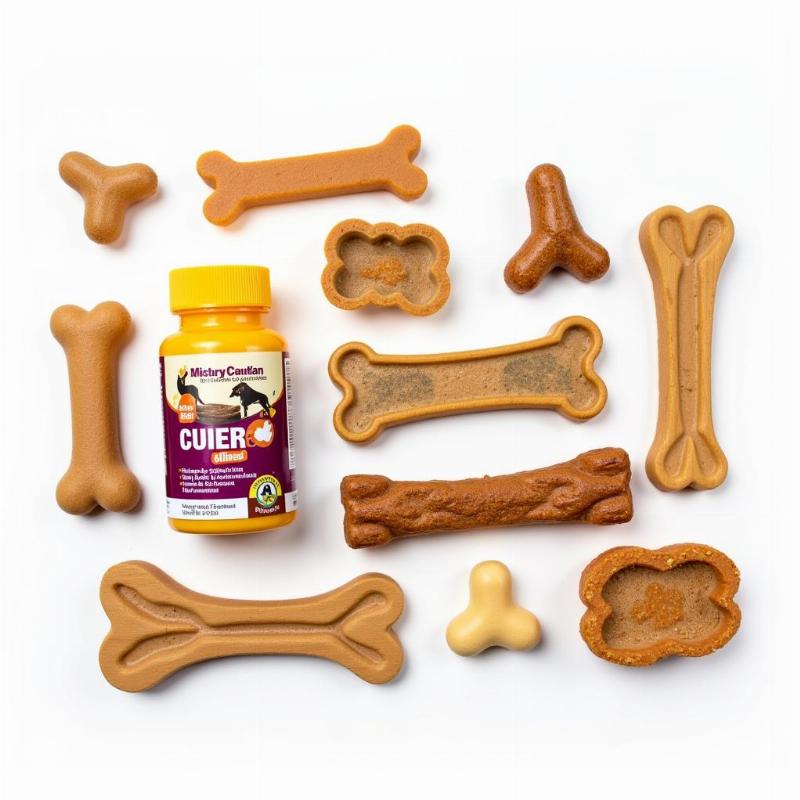Joint chews have become increasingly popular for senior dogs in the US, offering a potential solution to age-related joint stiffness and discomfort. As our canine companions enter their golden years, maintaining their mobility and quality of life becomes a top priority for owners. Choosing the right joint chew can make a significant difference in their comfort and overall well-being. This guide will explore the benefits of joint chews, key ingredients to look for, and how to choose the best option for your senior dog.
Understanding the Need for Joint Chews in Senior Dogs
As dogs age, the cartilage in their joints begins to break down, leading to osteoarthritis, a common degenerative joint disease. This can cause pain, stiffness, and reduced mobility, impacting your dog’s ability to enjoy everyday activities. Joint chews can help support joint health by providing essential nutrients that promote cartilage repair and reduce inflammation. They can also improve joint lubrication, allowing for smoother movement and greater flexibility.
 Joint chews for senior dogs
Joint chews for senior dogs
While joint chews can be a valuable addition to your senior dog’s care routine, it’s important to remember that they are not a cure for arthritis. They are designed to support joint health and alleviate symptoms, but they should be used in conjunction with other strategies, such as maintaining a healthy weight, regular exercise, and veterinary care.
Key Ingredients to Look for in Joint Chews
When selecting joint chews for your senior dog, look for products containing the following key ingredients:
- Glucosamine: This naturally occurring compound helps rebuild cartilage and reduce inflammation.
- Chondroitin: Another building block of cartilage, chondroitin supports joint structure and flexibility.
- MSM (Methylsulfonylmethane): This organic sulfur compound has anti-inflammatory and pain-relieving properties.
- Hyaluronic Acid: This substance lubricates joints and helps maintain cartilage health.
- Omega-3 Fatty Acids: These essential fatty acids reduce inflammation and support overall joint health.
Choosing the Right Joint Chew for Your Senior Dog
The best joint chew for your senior dog will depend on their individual needs and preferences. Consider the following factors:
- Size and Breed: Choose a chew that is appropriately sized for your dog to prevent choking hazards.
- Ingredients: Look for products containing the key ingredients mentioned above.
- Palatability: Ensure the chew is appealing to your dog to encourage regular consumption.
- Veterinarian Recommendation: Consult your veterinarian for personalized advice and recommendations.
Are Joint Chews Safe for Senior Dogs?
Generally, joint chews are safe for senior dogs when given as directed. However, always follow the manufacturer’s instructions and consult your veterinarian before introducing any new supplements to your dog’s diet. Some dogs may experience mild digestive upset, such as diarrhea or vomiting, when starting joint chews. It’s also important to choose chews made with high-quality ingredients and avoid those containing artificial flavors, colors, or preservatives.
Conclusion
Joint chews can be a valuable tool in supporting the comfort and mobility of senior dogs. By providing essential nutrients and reducing inflammation, they can help improve your dog’s quality of life and allow them to continue enjoying their favorite activities. Remember to choose a high-quality product containing key ingredients and consult your veterinarian for personalized recommendations. With the right care and support, your senior dog can enjoy many happy and healthy years to come.
FAQ
- When should I start giving my dog joint chews? You can start giving your dog joint chews as a preventative measure in their middle age, or as recommended by your veterinarian.
- How often should I give my dog joint chews? Follow the manufacturer’s instructions and your veterinarian’s recommendations for dosage and frequency.
- Can joint chews replace medication for arthritis? No, joint chews are not a replacement for prescribed medication. They can be used in conjunction with medication to support joint health.
- Are there any side effects of joint chews? Some dogs may experience mild digestive upset when starting joint chews.
- What should I do if my dog doesn’t like the taste of joint chews? Try different flavors or textures to find one that your dog enjoys. You can also try crumbling the chew and mixing it with their food.
- Are all joint chews the same? No, the quality and effectiveness of joint chews can vary depending on the ingredients and manufacturing process.
- Can puppies take joint chews? Generally, puppies do not need joint chews unless they have a specific medical condition.
Related Articles
benefits of pig ears for dogs
outdoor heated pad for dogs
are freeze-dried duck heads safe for dogs
charlotte’s web for dogs
Beautdogs.us is your premier online destination for all things dog-related in the US. We offer expert advice on dog breeds, care, and product recommendations. Whether you’re a seasoned dog owner or just starting out, Beautdogs.us provides reliable information on everything from nutrition to training. Contact us today for personalized support: Email: [email protected], Phone: +1 501-555-7529.